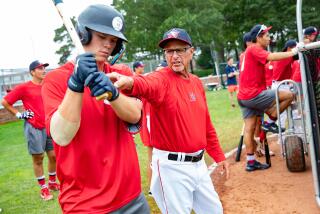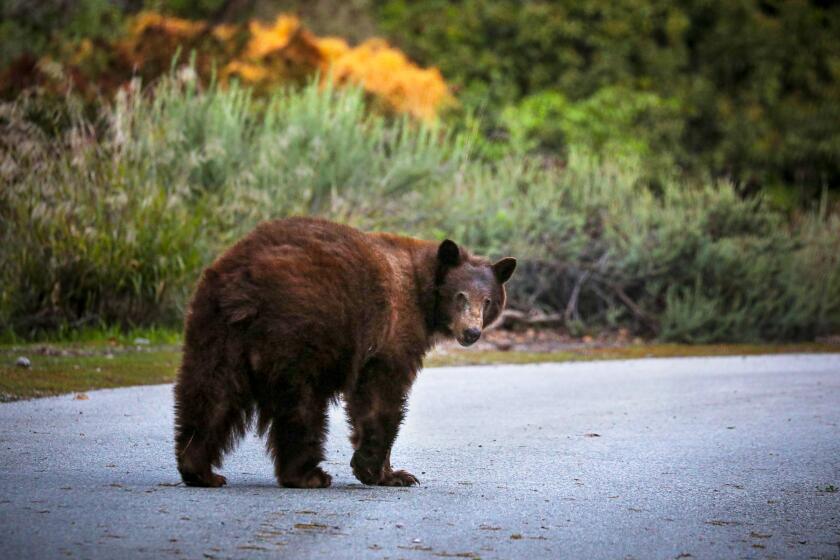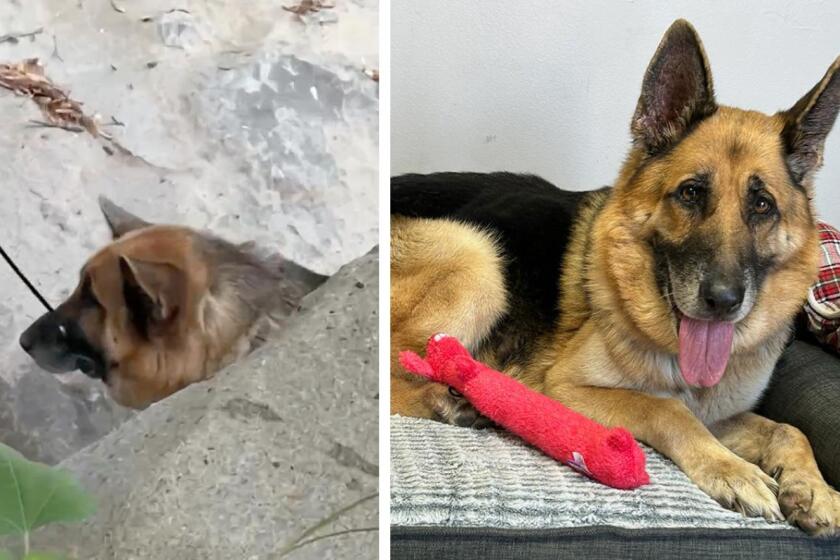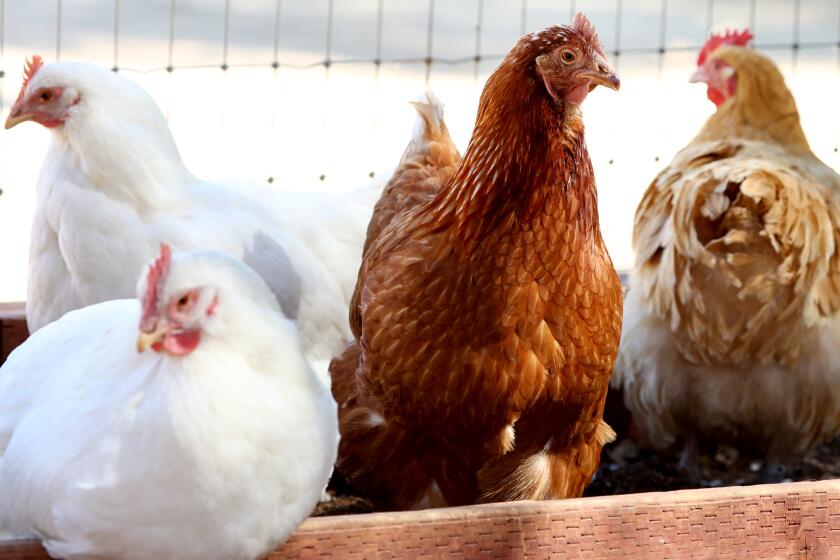Showing Some Horse Sense
Not long after wealthy Texan James McArthur paid $60,000 for a top 2-year-old quarter horse, Acton rancher Lowell C. Hillsinger sat down at a table in front of the auctioneer at the annual Vessels/Schvaneveldt sale and nervously waited to see what his only horse on the block would fetch.
Of the 211 horses for sale at this sprawling stud farm in northern San Diego County, Hillsinger’s Fast Lane Princess wasn’t top of the line, like the well-bred sorrel colt that prompted McArthur to outbid an Oklahoman and two ranchers from Brazil watching the proceedings via satellite.
But Hillsinger knew he wouldn’t get a better price anywhere else, and he soon walked away with $4,200 in his pocket.
“I figured I needed $4,000 to break even,” Hillsinger said. “My wife and I want to retire in a few years and I have a couple of even better horses I’ll bring here next year.”
In five years, the Vessels/Schvaneveldt sale has become one of the best-known, most profitable events of its type in the world. More than 2,000 horse-traders from around the world made their way east from Oceanside to the 2,000-acre farm that belongs to Frank “Scoop” Vessels III, grandson of Los Alamitos Race Course founder Frank Vessels II.
Conducted every August, the sale this year featured mares, colts, fillies and geldings offered by 39 sellers. The average purchase price for a horse this year? $16,453. Count Corona, brought to foal by the broodmare Corona Chick, a winner of 13 major quarter horse stakes races, fetched a state-record $332,500.
“In my opinion, this is one of the three best horse sales in the world,” said Brazilian horse trader Jorge Marcelo, who attended the sale and the traditional night-before barbecue with Sao Paulo veterinarian Luis Antonio C. Netto. “In Brazil, we would pay $25,000 for a horse. But for the quality here, the price is right.”
Veteran Los Alamitos trainer Blane Schvaneveldt, who has won all but three of the track’s training championships since 1979, got the idea for a horse sale about the same time Scoop Vessels was looking for a way to sell some of the stock he was raising on his farm. At the time there wasn’t a major horse sale in the state, at least, not along the lines of better-known auctions in Oklahoma, Texas and Kentucky.
“We got some of the best horses in the world right here right now,” said Schvaneveldt, who puts up 40-50 horses each year for sale. “California purses and racing is the best, better than anywhere, by far. There are more horses in Texas and Oklahoma, but the racing just ain’t that good.”
Scoop Vessels moved the family breeding business from the Los Alamitos track to San Luis Rey Downs in 1985. He views the sale as an opportunity to showcase his stable of horses, some of which date back in lineage to the early 1940s, when his grandfather was running quarter horse races on a muddy track in the middle of a beet field east of Long Beach. Within the next decade, Los Alamitos’ first track and grandstand were constructed on the site.
“Granddad and his friend, Huntley Gordon, went all over the country looking for mares and they went for the best quarter horses they could find to bring them back to California,” Scoop Vessels said. “From that group of horses we got our start. We’ve had 19 world champion quarter horses, and I want to continue that part of the family business.”
Two years ago, Vessels took the sale global, televising it via satellite. This year, 31 horses were sold to satellite bidders, many of whom reside outside the United States. Much of the credit for this year’s 200% revenue increase goes to those satellite buyers, Schvaneveldt and Vessels said.
It’s safe to bet father and grandfather would be proud of Scoop Vessels.
A stocky, bearded man with piercing eyes, Vessels, 44, grew up as a farmhand in the stock yards at Los Alamitos. His father wanted him to learn the horse racing business.
“They gave me a shovel and told me to go to work,” Scoop Vessels said. “The nickname stuck.”
Vessels saw the family breeding business as a sleeping giant, a small-time operation that had the bloodlines to become a major commercial venture.
“There are a lot of breeders out there in this business who have been in it as long as the Vessels have, but they didn’t have the far-sighted goals of breeding that went into the original set of horses,” said Walt Wiggins Jr., a quarter horse expert who runs the auction at prestigious Heritage Place in Oklahoma City. “Vessels can trace the strength of its program back to one or two individual horses. That speaks very highly of their original program.”
In 1981 the Vessels family bought a golf course along the banks of the meandering San Luis Rey River that was in need of repair after nearly being washed away by a flood two years earlier.
Two years later, Scoop Vessels purchased a repossessed horse training center located upstream from the golf course. He then purchased an adjacent ranch that included buildings dating back to the 1860s, some of which have been refurbished and remain standing today. Finally, he sold the family’s interest in Los Alamitos to a group of investors.
Vessels envisioned that, with a little river water, the rolling land could be made to look like a Kentucky thoroughbred farm. Drawing plans in the dirt for construction crews, they built stud pens, open-air barns and a small lake next to the grazing land. On a hill overlooking the homestead they built a 12,000-square foot home for Vessels’ mother, Mildred. When she died in 1992, Vessels moved into the house with his wife, Bonnie. Together, they oversee the day-to-day activities of the stud farm and its related farming interests.
There are more than 150 employees, some of whom live on the farm. A shrewd businessman, Vessels has diversified the productivity of his land. About 900 acres are reserved for horses, while the remaining 1,100 acres are used to raise avocados, oranges and commercial flowers. In addition, the family operates a feed business and the San Luis Rey Downs Resort, which is on the property.
In keeping with tradition, the atmosphere around the ranch is family oriented.
“They are just great people to work for,” said the farm’s secretary, Debbie McCain, who followed the Vessels from Los Alamitos to Bonsall. “The Vessels treat everybody like they are their family.”
Weeklong festivities give the auction a carnival atmosphere. A Who’s Who of quarter horse racing, along with their elaborate belt buckles and fancy cowboy boots, mills under the pavilion set up to protect bidders from the valley’s heat.
“Most everybody in the quarter horse business knows each other,” said former jockey Bobby Adair. “But there will be a lot of those horses that bring $100,000 at the sale. That’s when everyone gets serious.”
Indeed, on the morning of the sale the atmosphere has changed. The revelry stops. Gun-toting guests are asked to check their weapons at the gate before proceeding in their pickups and Cadillacs down a narrow blacktop road that gives way to a long, winding dirt path that leads to the ranch.
“No alcohol and no guns,” said ranch manager Danny Cardoza on the morning of the sale. “Yesterday was the party. Today, it’s all business.”
The mood in the auction pit has changed too. It’s serious business.
Schvaneveldt expects to sell about 30 horses per hour, but the sale, which begins promptly at 11 a.m., bogs down in the early going. At its conclusion eight hours later, 181 horses have been sold.
There are big spenders and little spenders.
McArthur’s Jaramar Ltd., for instance, lost in its bid to buy Count Corona but was able instead to snag Catch This Dash for $165,000. Jaramar Ltd. was the biggest spender at the sale, paying $322,500 to add to a stable that already includes Dashing Folly, the 1996 Los Alamitos champion horse, and current multiple stakes winner Corona Cash.
Two buyers from Mexico, who refused to give their names, walked away with Oh Sig, one of two colts put on the block by Laurel Walker of Arizona, for only $11,500.
“I like the horse,” one of the buyers said, “and it was cheap.”
More to Read
Go beyond the scoreboard
Get the latest on L.A.'s teams in the daily Sports Report newsletter.
You may occasionally receive promotional content from the Los Angeles Times.






